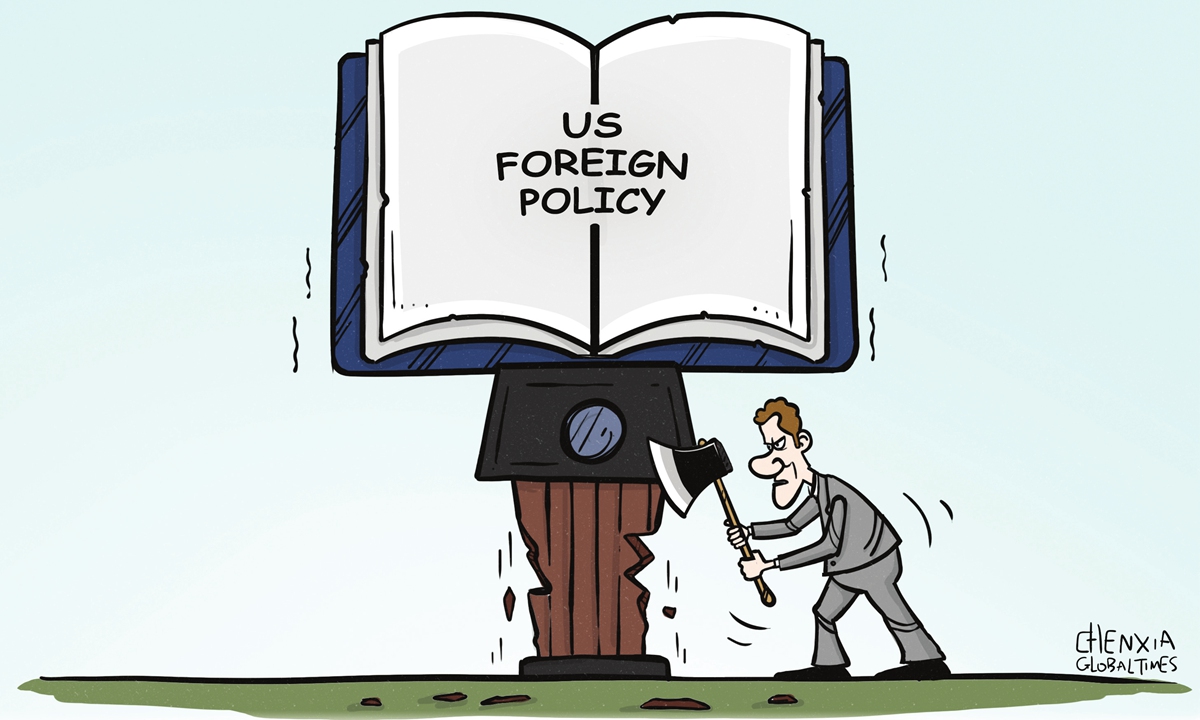
Illustration: Chen Xia/GT
US House Speaker Nancy Pelosi touched down in Taiwan island on the evening of August 2, sparking international outrage and plunging US-China relations to an all-time low. Chinese media is awash with understandable anger over the situation while US media has largely downplayed the visit, blaming Beijing for any escalations.
The incongruence in the perception of this event by both countries' media more or less follows the same pattern of how Pelosi's office, and surely Congress in general, saw the event: Just a political stunt and nothing more.
In US politics, such provocative and extravagant events are commonplace. In just a few months, Pelosi's Democratic Party will face the fight of its political life as it tries desperately to cling to narrow margins in both chambers of Congress. Losing the majority in the House, for example, would dethrone Pelosi as the speaker and cause her to lose any political clout.
In order to get ahead, politicians in the US do whatever they can to grab headlines. And in fact, there's an old saying that any publicity is good publicity. So as long as people are talking about Pelosi and the Democratic Party, they can stay relevant and hopefully boost their credibility to voters in November.
There's also a symbolic factor here, too. The administration of President Joe Biden has sought to make US competition with adversaries around the world a game of good versus evil, or, in his parlance, democracy versus autocracy. That's why any action that stands up to China, a so-called autocracy per the official narrative, is seen as a holy action and of serious symbolic importance.
Pelosi's trip, to her, was both an impactful political stunt and a symbolic victory. But undoubtedly, it was a strategic loss for the US itself. Even though the US media is painting the situation as China being the aggressor, the rest of the world clearly sees the US as a harbinger of chaos.
There is a multitude of ongoing political issues around the world right now, including the ongoing conflict in Ukraine, the situation regarding Iran's nuclear program, the perennial Israel-Palestine conflict, the conflict in Syria, the conflict in Yemen, and many more you could think of. But there is one common denominator in all that I've just listed: Washington. Should a conflict erupt over Taiwan in Asia because of Pelosi, this would be completely on-brand for the US and what it represents.
In addition, we can see that it demonstrates a consistent dysfunction of American politics. Now, to be fair, the US Constitution does grant certain foreign policy powers to each branch of government - at least in principle. In practice, however, the executive branch has consolidated a pretty much near limitless hold over foreign policy matters. That Congress can have such an outsized influence on foreign policy undermines established political norms within the US.
To be sure, there is some precedent here. During the administration of former president Barack Obama, many Congressional Republicans tried to undermine his administration's foreign policy. Senator Lindsey Graham and now-deceased Senator John McCain traveled extensively to conflict zones, like Syria and Ukraine, and urged pro-US forces to continue their fights - painting the administration's support for their cause as not sufficient.
Republicans also notably invited former Israeli Prime Minister Benjamin Netanyahu to speak to Congress, and thus to the American people, about Iran's nuclear program despite no invite from the White House. This was a major slap in the face to the executive branch's authority.
Still, Pelosi's visit goes a step above this. It directly undermined the political foundations of the most important relationship in global politics, namely the US-China relationship. China's understandable reaction to Pelosi's treachery means that the chances of a miscalculation that could potentially lead to outright war between the two leading superpowers undermines global security. However, make no mistake: This is all Pelosi's fault.
Not content with being so broken that undermines the very well-being of its citizens, the US Congress is now destabilizing an already unpredictable US foreign policy. That is a deeply worrying prospect for international diplomacy.
The author is a Prague-based American journalist, columnist and political commentator. opinion@globaltimes.com.cn




